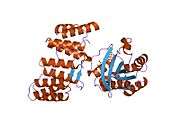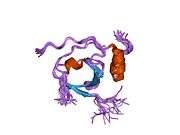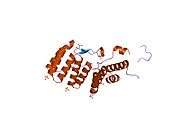Neutrophil cytosolic factor 2
| View/Edit Human | View/Edit Mouse |
Neutrophil cytosol factor 2 is a protein that in humans is encoded by the NCF2 gene.
This gene encodes neutrophil cytosolic factor 2, the 67-kilodalton cytosolic subunit of the multi-protein complex known as NADPH oxidase found in neutrophils. This oxidase produces a burst of superoxide which is delivered to the lumen of the neutrophil phagosome. Mutations in this gene, as well as in other NADPH oxidase subunits, can result in chronic granulomatous disease.[3]
References
Further reading
- Wientjes FB, Segal AW (1996). "NADPH oxidase and the respiratory burst.". Semin. Cell Biol. 6 (6): 357–65. doi:10.1016/S1043-4682(05)80006-6. PMID 8748143.
- DeLeo FR, Quinn MT (1997). "Assembly of the phagocyte NADPH oxidase: molecular interaction of oxidase proteins.". J. Leukoc. Biol. 60 (6): 677–91. PMID 8975869.
- Dorseuil O, Gacon G (1997). "[Signal transduction by Rac small G proteins in phagocytes]". C. R. Seances Soc. Biol. Fil. 191 (2): 237–46. PMID 9255350.
- Leto TL, Lomax KJ, Volpp BD, et al. (1990). "Cloning of a 67-kD neutrophil oxidase factor with similarity to a noncatalytic region of p60c-src.". Science. 248 (4956): 727–30. doi:10.1126/science.1692159. PMID 1692159.
- Kenney RT, Leto TL (1991). "A HindIII polymorphism in the human NCF2 gene.". Nucleic Acids Res. 18 (23): 7193. doi:10.1093/nar/18.23.7193-a. PMC 332837
 . PMID 1979859.
. PMID 1979859. - Francke U, Hsieh CL, Foellmer BE, et al. (1990). "Genes for two autosomal recessive forms of chronic granulomatous disease assigned to 1q25 (NCF2) and 7q11.23 (NCF1).". Am. J. Hum. Genet. 47 (3): 483–92. PMC 1683885
 . PMID 2393022.
. PMID 2393022. - Kenney RT, Malech HL, Epstein ND, et al. (1994). "Characterization of the p67phox gene: genomic organization and restriction fragment length polymorphism analysis for prenatal diagnosis in chronic granulomatous disease.". Blood. 82 (12): 3739–44. PMID 7903171.
- Leto TL, Adams AG, de Mendez I (1994). "Assembly of the phagocyte NADPH oxidase: binding of Src homology 3 domains to proline-rich targets.". Proc. Natl. Acad. Sci. U.S.A. 91 (22): 10650–4. doi:10.1073/pnas.91.22.10650. PMC 45079
 . PMID 7938008.
. PMID 7938008. - Dusi S, Rossi F (1994). "Activation of NADPH oxidase of human neutrophils involves the phosphorylation and the translocation of cytosolic p67phox.". Biochem. J. 296 (2): 367–71. PMC 1137705
 . PMID 8257426.
. PMID 8257426. - de Boer M, Hilarius-Stokman PM, Hossle JP, et al. (1994). "Autosomal recessive chronic granulomatous disease with absence of the 67-kD cytosolic NADPH oxidase component: identification of mutation and detection of carriers.". Blood. 83 (2): 531–6. PMID 8286749.
- Bonaldo MF, Lennon G, Soares MB (1997). "Normalization and subtraction: two approaches to facilitate gene discovery.". Genome Res. 6 (9): 791–806. doi:10.1101/gr.6.9.791. PMID 8889548.
- Bonizzato A, Russo MP, Donini M, Dusi S (1997). "Identification of a double mutation (D160V-K161E) in the p67phox gene of a chronic granulomatous disease patient.". Biochem. Biophys. Res. Commun. 231 (3): 861–3. doi:10.1006/bbrc.1997.6204. PMID 9070911.
- Sathyamoorthy M, de Mendez I, Adams AG, Leto TL (1997). "p40(phox) down-regulates NADPH oxidase activity through interactions with its SH3 domain.". J. Biol. Chem. 272 (14): 9141–6. doi:10.1074/jbc.272.14.9141. PMID 9083043.
- Ahmed S, Prigmore E, Govind S, et al. (1998). "Cryptic Rac-binding and p21(Cdc42Hs/Rac)-activated kinase phosphorylation sites of NADPH oxidase component p67(phox).". J. Biol. Chem. 273 (25): 15693–701. doi:10.1074/jbc.273.25.15693. PMID 9624165.
- Faris SL, Rinckel LA, Huang J, et al. (1998). "Phagocyte NADPH oxidase p67-phox possesses a novel carboxylterminal binding site for the GTPases Rac2 and Cdc42.". Biochem. Biophys. Res. Commun. 247 (2): 271–6. doi:10.1006/bbrc.1998.8775. PMID 9642115.
- Rinckel LA, Faris SL, Hitt ND, Kleinberg ME (1999). "Rac1 disrupts p67phox/p40phox binding: a novel role for Rac in NADPH oxidase activation.". Biochem. Biophys. Res. Commun. 263 (1): 118–22. doi:10.1006/bbrc.1999.1334. PMID 10486263.
- Patiño PJ, Rae J, Noack D, et al. (1999). "Molecular characterization of autosomal recessive chronic granulomatous disease caused by a defect of the nicotinamide adenine dinucleotide phosphate (reduced form) oxidase component p67-phox.". Blood. 94 (7): 2505–14. PMID 10498624.
This article is issued from Wikipedia - version of the 6/4/2016. The text is available under the Creative Commons Attribution/Share Alike but additional terms may apply for the media files.







